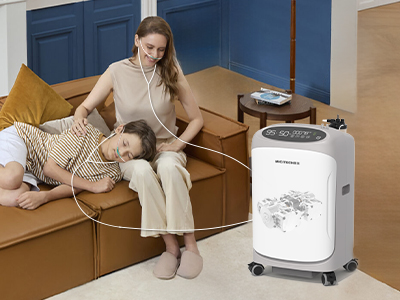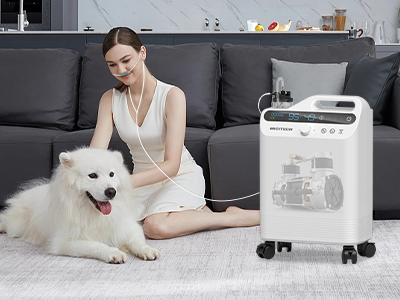09 Sep 2024
Oxygen air compressors play an indispensable role in both medical and industrial settings. From providing life-saving oxygen in hospitals to ensuring optimal air pressure in industrial operations, these machines are critical to countless processes. However, with the rise of counterfeit products flooding the market, recognizing an authentic oxygen air compressor has become more important than ever. Counterfeit compressors not only underperform but also pose serious risks to safety and health. Identifying these fake products can be a daunting task, but with the right knowledge, it is possible to avoid falling victim to them.

Common Characteristics of Genuine Oxygen Air Compressors
A genuine oxygen air compressor boasts several distinct characteristics that separate it from inferior copies. Authentic compressors are typically built to rigorous standards, with high-quality materials that ensure long-term reliability. They are also designed to meet strict regulatory requirements, particularly in medical applications where the purity of oxygen is non-negotiable. Genuine products will feature robust construction, smooth finishes, and clear markings from trusted manufacturers. Certifications such as CE, ISO, or FDA approvals are often prominently displayed on genuine machines, signaling their compliance with international safety standards.
Identifying Counterfeit Oxygen Air Compressors
Counterfeit oxygen air compressors, on the other hand, may exhibit numerous signs that give away their illegitimacy. One of the most obvious indicators is poor craftsmanship. Fakes often have inconsistent branding, where logos or model numbers may appear slightly altered, faded, or improperly placed. The packaging of these counterfeit products is often of substandard quality, with spelling mistakes or blurry graphics on the box. Upon closer inspection, the materials used in the construction of these compressors tend to be inferior, lacking the durability found in genuine devices. Components may feel flimsy or poorly fitted, which can lead to mechanical failures during use.

Checking for Certification Labels
Certifications are one of the most reliable ways to differentiate between a legitimate and counterfeit oxygen air compressor. Every compressor, particularly those used in medical settings, must adhere to strict regulatory requirements. Genuine compressors will carry certifications from recognized bodies like the International Organization for Standardization (ISO) or the European Conformity (CE) mark. To ensure these certifications are legitimate, it is crucial to cross-reference the information with official databases. Checking serial numbers or certification codes online can quickly confirm whether the product complies with industry standards or if it's a counterfeit.
Examining Pricing Discrepancies
While pricing may not always be a definitive indicator, it is often a key factor when identifying counterfeit products. Counterfeit oxygen air compressors are typically sold at a fraction of the price of legitimate products. If a compressor is listed at a price that seems too good to be true, it usually is. Authentic oxygen air compressors are manufactured using high-grade materials and advanced technology, which naturally comes at a higher price point. Opting for a cheaper, counterfeit alternative can lead to a myriad of problems, from inconsistent oxygen output to total mechanical failure.
Testing Performance and Functionality
Performance is where counterfeit compressors truly reveal their flaws. Genuine oxygen air compressors are designed to deliver consistent, high-performance operation under a range of conditions. Counterfeit versions, however, often struggle to maintain stable pressure levels or produce oxygen of sufficient purity. These machines may also exhibit irregular noises, overheating, or frequent malfunctions. If a compressor underperforms or fails to meet standard benchmarks, it is likely a counterfeit. Running tests on its functionality—such as measuring oxygen output, pressure consistency, and operational smoothness—can quickly reveal its authenticity.
Researching the Manufacturer
One of the most effective ways to avoid counterfeit compressors is by purchasing directly from reputable manufacturers or authorized distributors. Reputable brands often have a long-standing history of producing high-quality oxygen air compressors, with transparent supply chains and clear contact information. Counterfeit products are often sold by obscure companies or unauthorized third-party vendors. Before purchasing a compressor, it's essential to research the manufacturer, verify their credentials, and ensure they have a solid reputation in the industry. Trusted manufacturers often provide warranty options and customer support, which are absent in counterfeit products.
Consulting Experts and Third-Party Reviews
When in doubt, consulting experts or reading third-party reviews can provide valuable insights into the authenticity of an oxygen air compressor. Professionals with experience in the field can quickly identify counterfeit products based on subtle design flaws or performance issues. Online reviews and testimonials can also reveal patterns of dissatisfaction with counterfeit compressors. Customers who have unknowingly purchased counterfeit products often share their experiences, highlighting specific problems like poor build quality, short lifespans, or safety concerns. These reviews can serve as a warning sign, helping buyers make informed decisions before purchasing.
The Risks of Using Counterfeit Oxygen Air Compressors
The risks of using counterfeit oxygen air compressors extend beyond poor performance. Mechanical failure is a common issue, which can lead to dangerous situations, especially in critical medical environments where continuous oxygen supply is vital. Counterfeit compressors may also fail to meet the required safety standards, putting users at risk of injury or harm. Moreover, using non-certified equipment can result in legal and regulatory consequences, particularly for businesses that are required to comply with industry regulations. It's not just about financial loss; using counterfeit compressors can have serious health and safety ramifications.
Conclusion
By being aware of the common signs of counterfeits—such as poor build quality, lack of certification, and abnormally low pricing—buyers can avoid the risks associated with fake products. Thoroughly researching manufacturers, verifying certifications, and testing performance are essential steps in ensuring the compressor’s authenticity. In an industry where precision and reliability are paramount, investing in a genuine oxygen air compressor is not just a matter of efficiency—it’s a matter of safety and trust.
Keywords: air compressor
Originally published 09 Sep 2024, updated 09 Sep 2024.